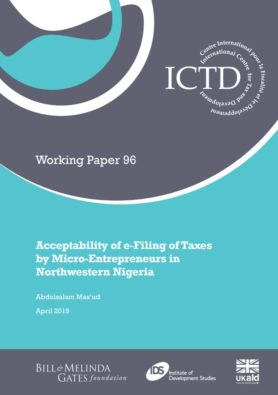Working Paper 96
E-filing for some kinds of tax payments was introduced at the federal level in Nigeria in 2013, yet it has not been made available by state government for the collection of Personal Income Tax from micro-entrepreneurs – a major source of revenue. This research was designed to investigate the acceptability of e-filing to micro-entrepreneurs in Northwestern Nigeria. Micro-entrepreneurs were asked what factors would affect their willingness to use e-filing should it become available. Data were collected through survey questionnaires from 384 micro-entrepreneurs and interviews with three tax consultants in the region. Performance expectancy was found to be the main predictor of e-filing acceptability by among micro-entrepreneurs: its use will likely enhance their ability to pay their taxes. Effort expectancy is the second main predictor, implying that micro-entrepreneurs believe that e-filing will be easy to use, and thus influence its acceptability. Social influence is the third main predictor of e-filing acceptability; friends, family, and business associates who value e-filing will influence its acceptance among micro-entrepreneurs. Trust in e-filing software was found to be an insignificant predictor of e-filing acceptability for micro-entrepreneurs. Lastly, awareness was found to be a negative factor that would affect the willingness of micro-entrepreneurs to use e-filing: while they are willing to use e-filing, they lack awareness of its operating modalities. In line with the findings, it is recommended that state governments in Northwestern Nigeria should introduce an e-filing system for collecting taxes from micro-entrepreneurs. The e-filing software design needs to be bilingual and fully reliable to gain the trust of its potential users, and the use of intermediaries to assist the users should be encouraged.
